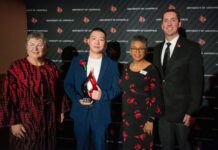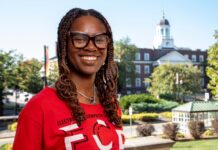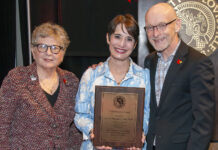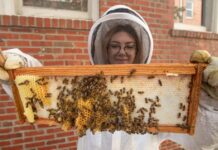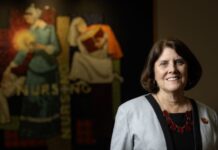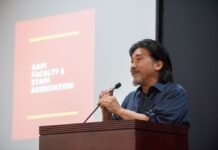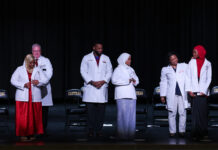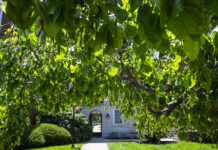
Just as the Kentucky Derby is one jewel in horse racing’s Triple Crown, UofL’s unique Equine Industry Program is a College of Business gem located within sight of the famous Churchill Downs twin spires.
The program is celebrating its 30th anniversary this year. Students who complete the program graduate with a business degree, making the program the only AACSB International-accredited business degree in the world with an equine major.
“This is unique, as most colleges and universities that offer horse programs are in the agricultural department. The basic classes are geared toward science disciplines,” said Terri Burch, program coordinator and faculty member, who has been with the program since it began in 1987. “Our program is a business degree with specialized equine business classes developed in-house. Parents love that about our program.”
It means that in a business that is as cyclic as the horse business, which ebbs and flows with the health of the economy, UofL equine graduates can always find a job, even if it is in another industry.
“Agricultural degrees are not as versatile,” Burch said.
About half the students in the program are Kentucky residents, she said, and it attracts international attention. Students from as far away as China have studied in the program.
Equine students often work at Churchill Downs in various roles and to be sure, the track will be filled with students, faculty and alumni of the program during Derby 2017. If you’re looking for equine student Leah Vasquez on Oaks and Derby weekend, she will be with Dale Romans, trainer of J Boys Echo. She has been working as a photographer for Romans, handling some of his social media accounts.
Last year, equine grad Jack Sisterson was working as an assistant trainer to Doug O’Neill, who trained Kentucky Derby winner Nyquist. He also worked with O’Neill in 2012 when they conditioned Kentucky Derby and Preakness winner I’ll Have Another. In 2015, equine student Megan Riddle worked with NBC on Triple Crown and Breeders Cup coverage, getting the chance of a lifetime to watch American Pharoah win all four races and become the first horse to win American horse racing’s Grand Slam, as well as the first Triple Crown winner since 1978.
Equine grad Andre Stock was an assistant to trainer Larry Jones when Jones had two Kentucky Oaks winners – Believe You Can in 2012 and Lovely Maria in 2015.
Equine alumni can be found in almost every horse industry nook and cranny. Besides Churchill Downs, they’ve been scooped up by Keeneland, Santa Anita Park, California Thoroughbred Breeders Association, Jockeys Guild, TwinSpires.com, WinStar Farm, Hermitage Farm, Carousel Horse Farm, Stone Place Farm, Roberts Communications Network and Paulick Report, just to name a few.
A niche industry filled with nuances
One graduate, Sean Beirne, is chairman of the Colorado Racing Commission and also works for Roberts Communications Network. Beirne returned to Louisville earlier this year to guest teach a class on issues in the equine industry.
“I wouldn’t be where I am if it weren’t for the equine program,” said Beirne, who said a business background is absolutely essential for success in an industry that has become entirely focused on financial prowess.
“That’s where these guys have the advantage over their counterparts,” he said.
But the program also opened doors for him. He learned to call races during his internship at River Downs, and went on to call 12,000 races during his early career.
“You know, you make these connections and … you have to run with the ball after you get it, but a lot of that I owe to this school,” he said. “And I’ve always wanted to come back here and speak to the students.”
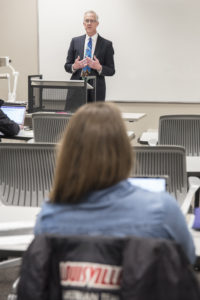
He said students of the program receive an education that is specialized in what is a niche industry filled with nuances. One of the issues he still deals with as racing commissioner is that of horses racing on medication. “You know, I remember writing that paper” as a student in 1988, he laughed.
The equine program has graduated 305 students since 1989, when the first – and at the time only – graduate earned the degree. 2012 saw the most equine graduates with 21.
Burch said the horse industry has changed as technology has advanced in the last three decades.
“We’ve witnessed the introduction of telephone wagering, off-track betting and simulcasting, the formation of … ‘racinos’ (race tracks combined with casinos), shuttering of racetracks, surface innovations, after-care market expansion … historical betting machines, Facebook, Twitter, Snapchat, etc.,” she said. Other industry-changing events have been the advancement of “super purses” (very large purses paid out after a race) and events such as the Pegasus and Dubai world cups.
In every case, the program has kept up with the changes to give the students their best chance at breaking into the industry.
Although there is no riding component to the program, UofL has four equine sports teams that many of the students participate in – hunt seat, western, saddle seat and polo. A new team, eventing, starts this fall. The teams are run by students who elect officers, hold meetings and raise their own money. UofL has partnerships with four stables that allow students to either board their own horses or ride the stables’ horses for lessons, practice and competitions.
The family-like atmosphere among the students, faculty and staff of the program, located in the west wing of the College of Business, was sadly evident in late April following the death of Tim Capps, an industry heavyweight who had been the program’s director since 2011. Capps, 71, had been hospitalized since mid-February following a stroke.
His death was widely reported in horse trade industry publications, and the College of Business recently established a scholarship fund in his name.




